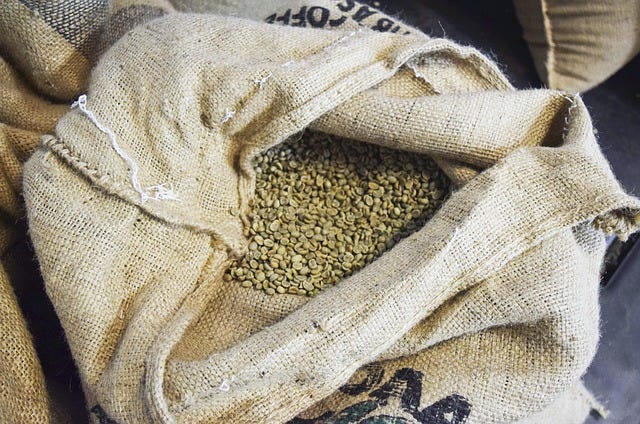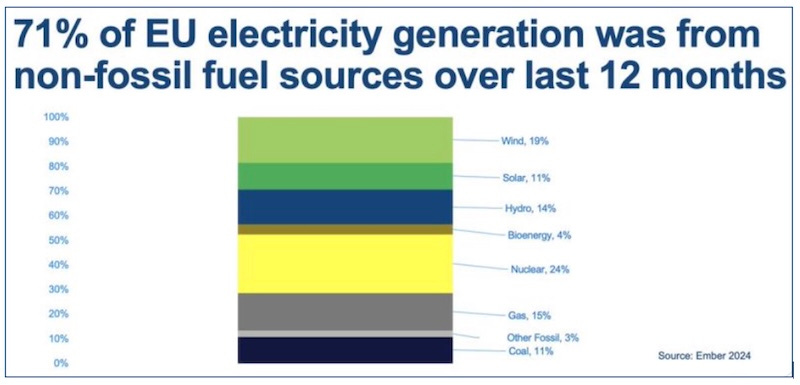Coffee Price Shock Brings Climate Change to Everyone’s Front Door
With the world’s two biggest coffee producers, Brazil and Vietnam, facing simultaneous droughts, future crops are in jeopardy and prices are on the rise. Now it’s getting personal.
The sheer force and massive chaos of Hurricane Helene this week was our latest reminder that no one is safe as climate change accelerates: as Fast Company magazine put it, there’s no such thing as a “climate haven”.
But it was another, much smaller story that showed how the climate crisis, fuelled by unrestrained fossil fuel extraction and governments’ utter failure to rein the industry in, is beginning to shift the basic small stuff we all rely on in our everyday lives. With the world’s two biggest coffee producers, Brazil and Vietnam, facing simultaneous droughts, future crops are in jeopardy and prices are already beginning to rise, The Canadian Press reported late last month.
Before too much longer, you might be tempted to check your credit union or bank balance before you sit down with your favourite morning beverage to read through your favourite weekend climate digest.
For many of us, that’s a bit exaggerated. But when climate change hits such a basic part of our daily routine? Now it’s getting personal.
“Coffee is the canary in the coal mine for climate change and its effect on agriculture,” said Elizabeth Shapiro-Garza, associate professor of environmental policy and management at Duke University. “If you like your cup of coffee in the morning, climate change is absolutely going to be affecting the quality, the availability, and the price of that cup of coffee.”
The reality is already showing up at coffee counters across the country: prices rose 23.2% between July, 2020 and July, 2024, according to Statistics Canada data, and future commodity prices for coffee are on the rise.
If you’re a tea drinker, this moment of relief or schadenfreude might be short-lived, with flooding and drought hitting key producers like China, India, Rwanda, and Kenya.
“At the end of the day, continued global warming will make growing quality teas harder and more expensive,” writes Arbor Teas, a family-run tea business based in Michigan. “Both the quality and quantity of production will be reduced (or at least become more erratic), and thanks to the supply and demand curve, this will mean higher tea prices for the consumer.”
And You Thought Everything Ran on Oil?
This kind of news adds a new dimension to the idea so many people still carry around that the world will always, inevitably run on oil. It still does, largely, but that’s starting to change, and the shift is gaining momentum, even if it’s still uneven. Meanwhile, if you don’t think most of us depend on coffee or tea for everything we get done in the day, just imagine a day or a week without it.
Imagine legions of tired, headachy, cranky people trying to hit deadlines or have civil conversations. At least until we all begin to adapt to a change that none of us asked for, and few of us likely imagined before the climate crisis showed up at our front doors.
Even the additives matter. When everyone at Lancaster, UK-based Small World Consulting decided to go a week without dairy in their drinks, after realizing it accounted for the lion’s share of the climate footprint in every cup, “we survived. It was horrible. I’m going to pick different battles,” recounted company director Mike Berners-Lee in his 2010 book, How Bad Are Bananas? The Carbon Footprint of Everything. (Since you asked—as a matter of fact, yes, he is related to that other Berners-Lee.)
Anyone who’s lived through far worse deprivations than going without coffee or tea would probably tell you that it doesn’t quite make the list of life’s essentials. But the fight to get climate change under control is about building the world we want while leaving no one behind, not just eking out the barest, meanest existence. In the world we choose, many of us will still be running on coffee or tea, long after we’ve forgotten why we ever had to run on oil.
In the bigger scheme of things, coffee and tea are also a great example of a lesson we learned from COVID: that we all live at the receiving end of a supply chain whose fragility we only see if it begins to collapse.
As Arbor Teas points out in a thoughtful exposé on tea and climate change, today’s international tea shipments absolutely depend on fossil fuels. Principally sea freight, brought to you by a marine shipping industry that lobbied successfully to keep itself out of the 2015 Paris agreement and has worked hard ever since to delay, dilute, and dismiss any moves to get its climate footprint under control.
A Huge Global Commodity
Coffee and tea supplies are the latest example of a structural issue, brought to us by climate change, that affects our daily lives but is bigger than we can solve on our own.
It’s also a much bigger industry, with a far wider climate and environmental footprint, than most of us imagine as we sort through the ridiculously long list of ordering options at one of the world’s most ubiquitous coffee chains. Coffee is one of the biggest global commodities, second only to petroleum itself, with more than 2.25 billion cups consumed around the world each day, according to crop diversity researchers at Bonn, Germany-based Crop Trust.
It's also a business with gaping inequities between huge buyers and coffee plantations and small growers, between the global North and the global South. “Currently, it is estimated that up to 80% of smallholder farms are living below the poverty level,” writes 43 Factory Coffee Roaster, a local coffee chain in Vietnam. “They face great disadvantages and challenges compared to large-scale, more qualified manufacturers,”
One of the original motivations for the fair trade certification movement was to right those wrongs. “Farmers who grow fair trade coffee receive a fair price, and their communities and the environment benefit as well,” explains Poulsbo, WA-based Grounds for Change. “Fair trade certified coffee directly supports a better life for farming families in the developing world through fair prices, community development, and environmental stewardship.”
Like pretty much any green or economic justice certification, fair trade has run into complications and received its share of criticism, now dating back more than a decade. But now, the gains that fair trade has been able to achieve face a bigger threat, as climate impacts in some of the world’s most vulnerable countries and regions imperil crops and drive up prices.
Waking Up with Coffee
But even if most of us wake up with coffee or tea to start our day, we shouldn’t expect to see large numbers of our friends and family, neighbours and colleagues “wake up” to the climate emergency, as some climate hawks might hope, after seeing how it affects their morning beverage.
For far too long, much of the climate community carried around the oldthink hope or assumption that as the impacts of climate change became more obvious and severe, public support for emission reductions and the energy transition would be unstoppable. Things would have been a lot simpler if that had been true, but it just isn’t happening.
Polling now shows climate change receding as a top-tier policy issue, overtaken by public concern about the cost of housing, food, and other basics. Climate change is one of the driving forces behind the daily cost crunch, and it’ll be with us for far longer than a short-term bout of inflation that now seems to be winding down. Yet climate rarely shows up in an affordability discussion where a desperate demand for immediate relief is met mostly by partisan political posturing.
But there’s another way to connect those dots with people bearing the brunt of the affordability crisis, and it’s pretty obvious when you boil it down. It starts by realizing that a conversation will go a lot better when the first question, out loud or implied, is “How are you doing?”, rather than “Why aren’t you listening to me yet?”
Start from the Ground(s) Up
If people are stuck choosing between food and fuel because they can’t afford to pay for both, they won’t likely be thinking about their carbon footprint over their morning coffee, even if they live in some of the country’s highest-emitting, most energy-inefficient housing. Especially not after Ottawa cut back its greener homes grant and then skimped on the replacement funding program.
But if an energy retrofit goes deep enough to mostly wipe out that household’s monthly energy bill, while making the home healthier, safer, and less drafty—that’s a different conversation that still leads to permanent emission reductions, and doesn’t have to start by negotiating any of our usual “c-words” like “climate” or “carbon” or “crisis”.
The connection is less direct for coffee, tea, and a wide menu of food products that have been facing climate price shocks for years. Here, the answers may be half a world away, where most of us will never get a direct look at the devastating impacts small farmers face or the solutions that can help them survive and thrive.
But the basic approach is the same as putting energy bills and healthier homes at the centre of an energy retrofit plan: start from where people are at and what they need most. In its segment on tea and climate change, Arbor Teas talks about planting drought- and stress-tolerant cultivars, diversifying production, combining tea plants with other crops, protecting tea crops with shade trees, and other measures that shield producers’ livelihoods while helping them withstand local climate impacts.
So it’s the same old story—we know what to do, if only the dollars were available to get it done. But the chances are slim to nil that this year’s United Nations climate summit in Baku, Azerbaijan will deliver on those solutions. So far, the third petrostate in a row to host the annual climate negotiations seems most interested in skipping over any discussion of a fossil fuel phaseout and arresting climate and human rights advocates before the conference gets under way November 11.
That’s a big problem when we know that the impacts we’re already scrambling to adapt to, across North America and around the world, are the result of average global warming that is still a bit short of the 1.5°C target in the 2015 Paris climate agreement. The evidence is all around us that, if fossil fuel companies have their way, climate devastation will roll far past the point where there’s anything we can do to adapt to it.
Which means that, unless this rogue industry is quickly brought under control, we’ll have far more than our morning cup of coffee to worry about.
Mitchell Beer traces his background in renewable energy and energy efficiency back to 1977, in climate change to 1997. Now he and the rest of the Energy Mix team scan 1,200 news headlines a week to pull together The Energy Mix, The Energy Mix Weekender, and our weekly feature digests, Cities & Communities and Heat & Power.
Chart of the Week
Helene Leaves Trail of Death, Darkness, Despair Across U.S. Southeast
Dozens of Coast-to-Coast Climate Events Mark National Seniors Day October 1
Coffee Prices Up, Quality Down as Drought Hits Crops in Brazil, Vietnam
Globe and Mail Editorial Demands Real Emission Cuts from Oil and Gas
Crushed Rock Spread Across Ontario Fields in New Push to Capture Carbon
Cities Thrive With Fewer Cars, Multiple Studies Reveal
Affordable Housing Squeezed as Climate Hits Insurance Market
AI Could Drive Clean Energy Boom as Investors Question Climate Footprint
‘Communicating Fire’ Raises the Alarm on Climate Change: Vaillant
Big U.S. oil companies reveal massive payments to foreign governments (Reuters)
Melting glaciers force Swiss and Italians to redraw border (The Times)
Colombia Looks to Future Without Oil in US$40B Transition Plan (Bloomberg)
Indigenous Group Asks U.S. Regulator to Scrutinize Fracking Companies Operating in Argentina (Inside Climate News)
TotalÉnergies to sign US$10B deal on Suriname’s first offshore project, sources say (Reuters)
Solar+storage dominating future U.S. power grid (PV Magazine)
Midwestern U.S. grid says ‘concerns are growing’ after less than 2 GW added this year (Utility Dive)
New Jersey hits pause on offshore wind farm that can’t find turbine blades (The Associated Press)
Birdlife threat blows Scotland’s offshore wind plans off course (Financial Times)
Thieves Hunting for Copper Are Vandalizing American EV Chargers (Bloomberg)
I’ve studied geopolitics all my life: climate breakdown is a bigger threat than China and Russia (The Guardian)
On Climate Week and Toxic Positivity (Drilled)









As an enthusiastic coffee believer, this one hits hard. And I think that is the point here. Thanks for this insight into how we can keep moving this conversation forward with impacts now becoming part of our daily lives.
It's nice to hear from you, Joan! Absolutely, sitting politicians will be blamed for high food prices, in both our countries and I suspect pretty much everywhere else.
I think we're learning that it was a big mistake to expect people to "wake up" to climate change as its impacts get worse. That operates on a couple of levels.
If someone's right in the eye of the storm, literally or figuratively -- in Asheville or Jasper, in Lytton, B.C. or Paradise, California -- the day after you've lost everything is the absolute worst time to be lectured about climate change. John Vaillant, author of a brilliant book about the wildfire that took out much of Fort McMurray, Alberta in 2016, makes the point really well here: https://www.theenergymix.com/communicating-fire-spotlights-really-charismatic-symptom-of-climate-change-vaillant/
If a household is just barely getting by in a lousy economy -- the reference in today's Weekender to anyone who ever has to choose between food and fuel -- climate change won't be the top-of-mind issue, even if it's making that issue worse.
And in your industry, if meetings and hospitality people know they depend on vulnerable facilities like hotels and convention centres, not to mention airlines and other modes of transport, but the solutions are beyond their experience or job responsibilities and have been too heavily politicized by the fossil fuel industry...they aren't going to want to hear about climate change, either.
Which doesn't mean we submerge the issue or practice climate denial ourselves. Just that if we want the conversation to end well for all concerned, we need to find the common ground that will give us a starting point, as I suggest in this post.
You and I have known each other for long enough that we can both remember when I used to awfulize at meetings industry people about the dangers of climate change, then wonder why those conversations never got any traction. I absolutely agree the industry needs to move much farther, much faster on this, but TBH I don't think I helped that along one bit with the way I used to show up.
In recent years, it's actually been a lot of fun to challenge myself to see how far I can get into an "outside the bubble" conversation without invoking any of the standard "c-words" that I refer to in the post. It's a habit that has to be learned...but once you get used to it, you never look back. The interactions are so much richer and more genuine, you get to learn a tonne from people whose experience and perspectives are different from yours -- and it gets results!